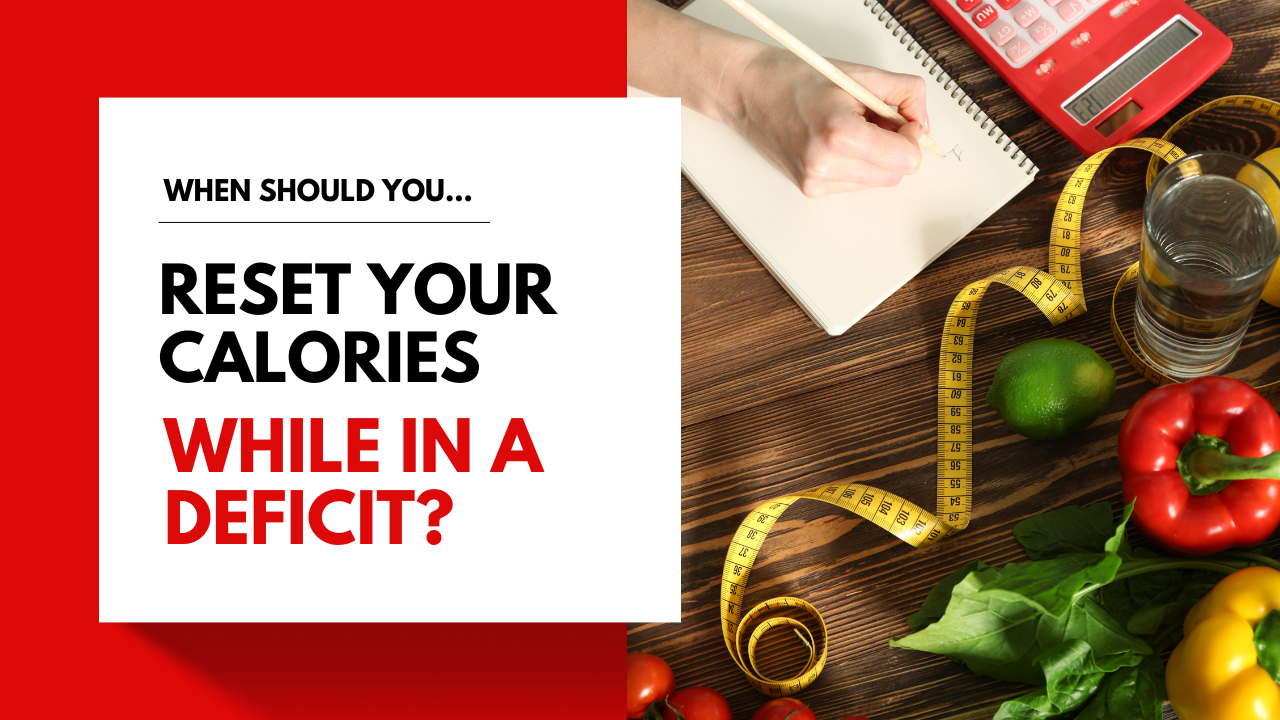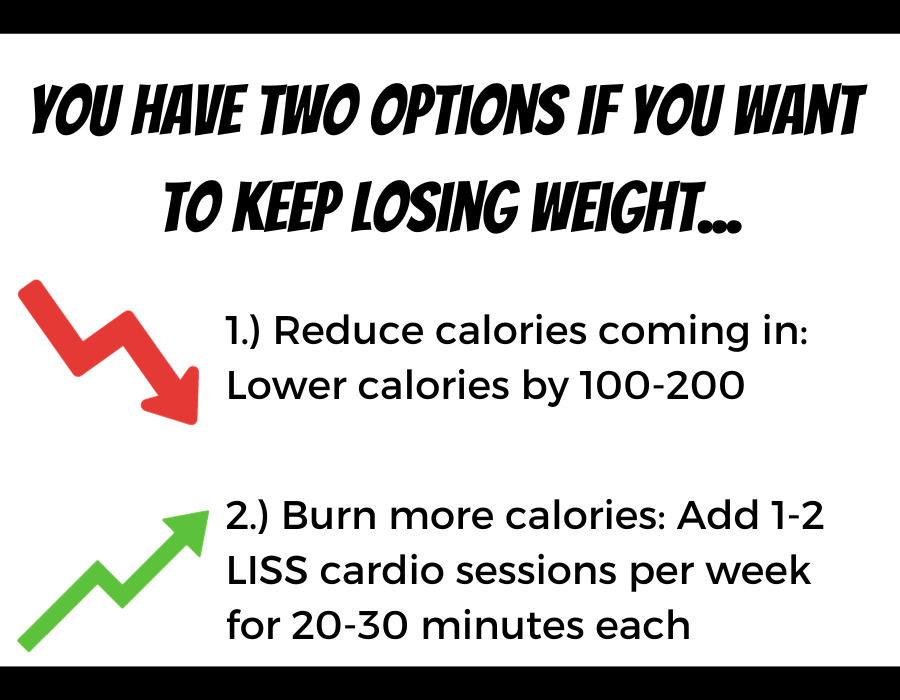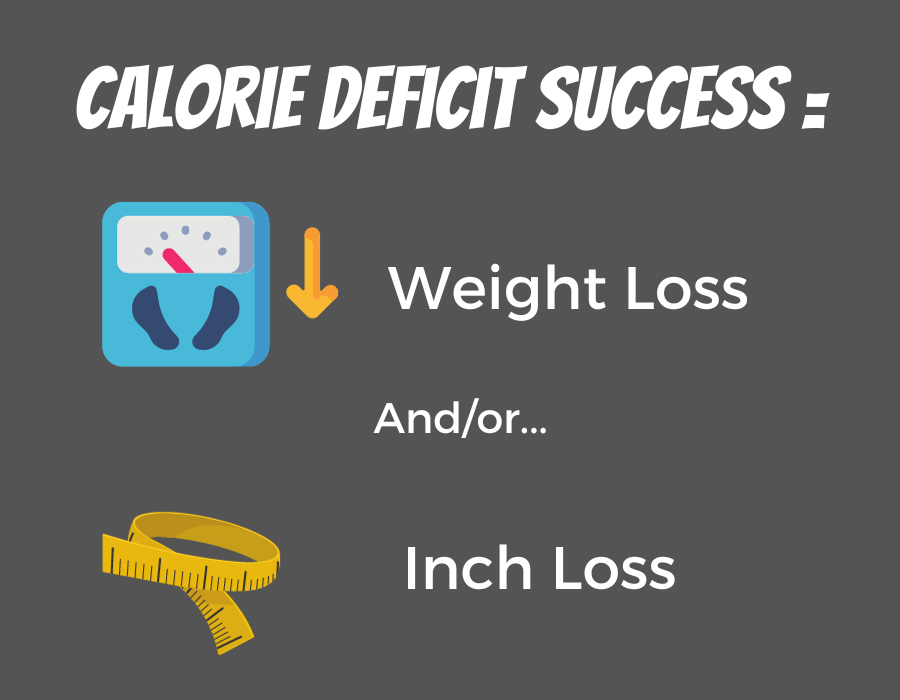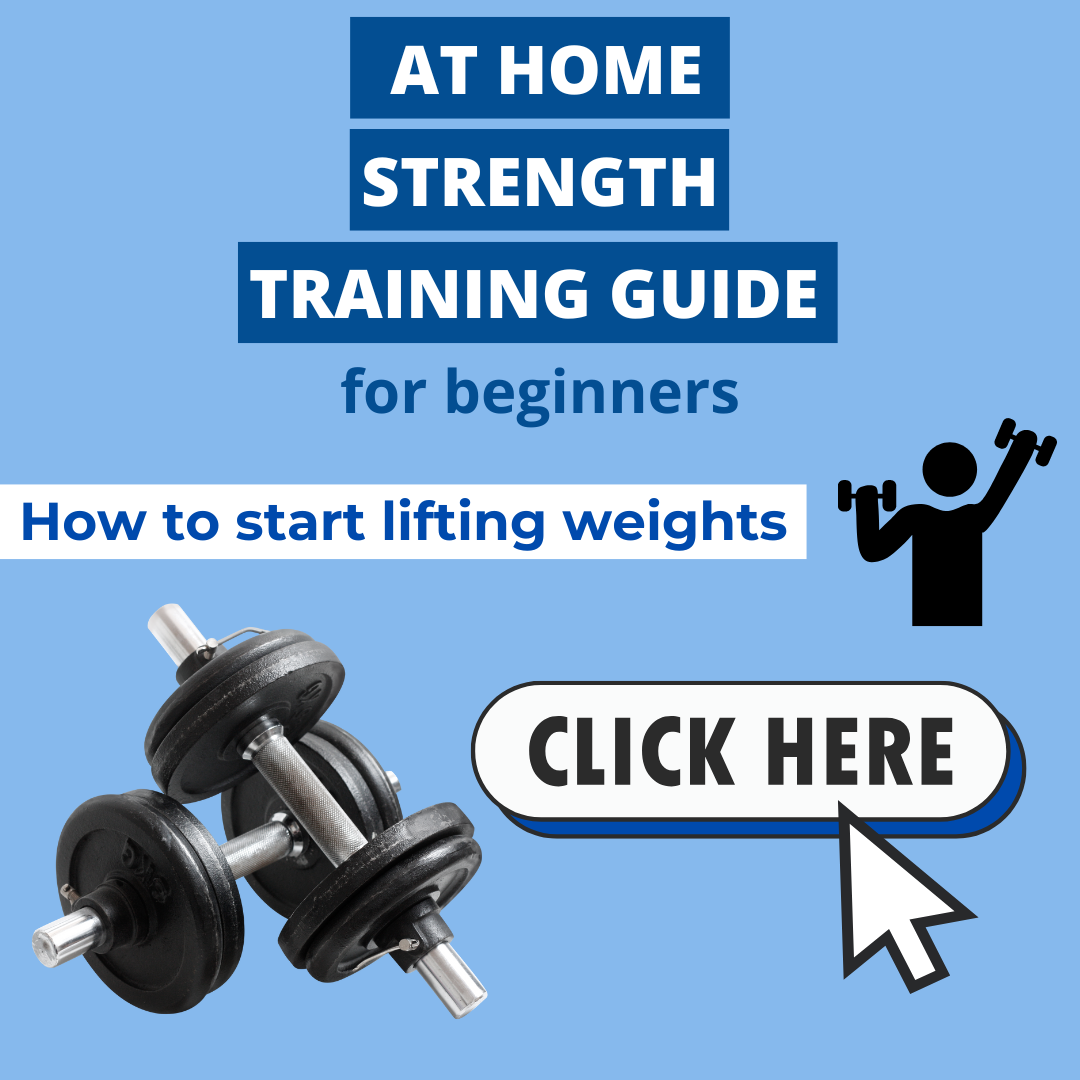
Weight loss requires a calorie deficit, that much you know.
And to get the scale trending in the right direction, you’ve been:
- Counting calories or tracking macros
- Lifting heavy things 3-4 times per week
- And hitting your daily steps goal
So far, so good.
You’re ready to ride this weight loss bus until the wheels fall off.
But you can’t help but wonder…
At some point, shouldn’t you recalculate your calories to ensure you continue to make progress?
And on top of that, how often should you do this?
You don’t want to run into a situation where you hit a plateau and just stop losing weight altogether.
In this post, we’ll talk about when to reset your calories so you can keep seeing results.
Why you need to adjust your calories as you lose weight

First, let’s talk about why you even need to recalculate your calories to begin with.
The more weight you lose, the fewer calories you’ll need if you want to continue making progress.
Here’s an example of what I’m talking about:
Let’s say you start your diet out weighing 200 pounds and your deficit calories are 2,500.
Eventually, you make your way down to 190 pounds.
You weigh less, and as your weight goes down, your metabolic rate decreases (smaller people burn fewer calories).
Your body says, “ Yo, I don’t need as many calories as I once did.”
So if you want to continue losing weight, you’d have to recalculate your calories and eat a little less than the 2,500 calories you initially started with.
Just remember this: As your weight goes down, so should your calories.
When should you recalculate your calories for weight loss?
First off, is there even a need to recalculate your calories?
If it ain’t broke, don’t fix it.
So if you’re still losing weight and/or losing inches there’s nothing to change.
The second question you should be asking yourself is…
Have I been consistent with maintaining my calorie deficit?
Consistency means this:
- You’ve been counting calories correctly (I.e. you weigh out your food in GRAMS, which is the most accurate way to do things). Counting calories the right way also means accounting for all the little nibbles, bites, handfuls, sips, and extra snacks you have throughout the day (which can add up to hundreds of extra calories if you’re not careful). These are just a couple examples but you get the idea.
- Staying on top of your weightlifting sessions and cardio: Not skipping workouts just because you’re not feeling motivated, you’re tired, or **insert whatever the reason is here**.
- Not taking weekends off from sticking to your nutrition because you “earned it.” You’re giving up on basically 30% of your week when you do that.
- Being in a calorie deficit for more than 3.5 seconds: You haven’t hit a plateau. You just haven’t been in a calorie deficit long enough to see any meaningful progress.
If you’ve been AT LEAST 90% consistent over the past 3-4 weeks but STILL aren’t seeing any progress, then, at that point, it’s safe to say you need to recalculate your calories.
Not seeing any progress = You’re not losing weight and / or inches.
How to reduce your calorie intake

So you’ve determined you need to reset your calories.
Now, how do you do that?
You can either:
A.) Reduce the number of calories you have coming in (I.e. eat a little less)
Or…
B.) Increase your energy expenditure (I.e. burn more calories through a little more exercise).
With option A, I’d recommend decreasing your calories slightly by about 100-200.
And for option B, nothing too crazy here, just add in 1-2 LISS cardio sessions for about 20-30 minutes each per week.
The important thing is that you don’t do both at the same time, at least for now.
You don’t want to do more work than you have to when it comes to recalculating your calories.
Start with one, see if that works, and if it doesn’t, then you can add in the other one on top of that.
How long should you be in a calorie deficit?

How long you should stay in a calorie deficit will depend on various factors.
How much weight do you have to lose?
How aggressive is your cut going to be?
Do you plan on implementing refeed days or taking diet breaks?
Those are just a few questions to consider but if you want some more detail and insight on this topic, HERE’S AN ARTICLE I wrote to help you out with that.
How to set a calorie deficit
Now’s the time to throw that generic and outlandishly ridiculous 1,200-calorie meal plan you found on Pinterest right where it belongs…
In the trash.
A calorie deficit isn’t some one-size-fits-all formula.
Your ideal calorie intake to lose weight will be different than Jan down the street or Bob in accounting at work.
You want to be in a slight caloric deficit, nothing too extreme or aggressive.
The word “moderate” is a good way to think about your deficit.
THIS POST will walk you through how to set up your deficit and get the number of calories you should be eating for weight loss.
When should you lower calories on a cut?
If your goal is fat loss, that automatically puts you in the “cutting” category.
So you’d just follow the steps we’ve gone over in this post.
Jump back up into the “When should you recalculate your calories for weight loss?” section.
How do I know if my calorie deficit is working?

Calorie deficit success simply equals…
Weight loss and/or inch loss.
You’re not truly in a calorie deficit otherwise.
“Ugh! Well, what’s holding me back?!” you ask yourself.
READ THIS ARTICLE if you want to fix things and start seeing progress!
How many pounds can you lose in a month with a calorie deficit?
As a general rule, you can expect to see somewhere between 0.5-2 pounds of weight loss per week (so roughly 2-8 pounds per month).
Key phrase: “As a general rule” because there’s not some universal, definitive answer that just applies to everyone.
You might lose a little bit more or you might lose a little bit less.
If you are losing weight but maybe not losing it as fast as you’d like, don’t minimize your results by saying something to yourself like “Well, I ONLY lost X pounds this month.”
Progress is progress, my friend.

What's up?
I’m Chad, I’m happy you’re here! I’m a certified personal trainer and my goal is to help you form practical, sustainable habits that lead to lifelong fitness results. If you want to lose fat, build muscle, and live a healthier, happier life then you’re right where you need to be. 💪🏾
Free resources
⬇⬇⬇







0 Comments